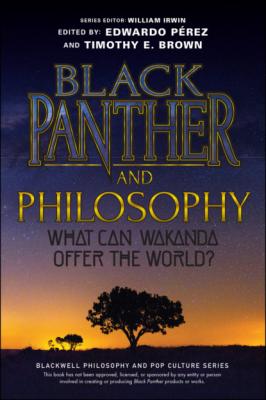Black Panther and Philosophy. Группа авторов
Чтение книги онлайн.
Читать онлайн книгу Black Panther and Philosophy - Группа авторов страница 18
 this to the filmmakers’ credit rather than blame. “It renders a verdict on imperialism as a tool of black liberation,” Serwer argues, “to say that the master’s tools cannot dismantle the master’s house.”18
this to the filmmakers’ credit rather than blame. “It renders a verdict on imperialism as a tool of black liberation,” Serwer argues, “to say that the master’s tools cannot dismantle the master’s house.”18
Whatever else is going on, that last phrase is definitely on point: against poet Audre Lorde’s warning, Killmonger is confident he can use the master’s tools to do just that. He says as much when he becomes king (“I know how colonizers think. So we’re gonna use their own strategy against’em”) and in response to T’Challa (“I learn from my enemies, beat them at their own game”) in their final confrontation. His actions show this too. Orchestrating regime change in Wakanda, he follows his training, disrupting existing leadership structures and destroying the cultivated crop of Heart-Shaped Herb. As Agent Ross says, “He’s one of ours.”
Nakia, T’Challa, and Relational Repair
Killmonger insists on what T’Chaka wants to ignore, that the people within Wakanda’s borders exist in relation to the people outside them. And though Killmonger doesn’t make it to the end of the film, this vision of Wakanda in the world does. Recall T’Challa’s words to the United Nations (here’s one time when the post-credits sequence is absolutely essential):
Wakanda will no longer watch from the shadows. We cannot. We must not. We will work to be an example of how we, as brothers and sisters on this Earth, should treat each other. Now, more than ever, the illusions of division threaten our very existence. We all know the truth – more connects us than separates us. But in times of crisis, the wise build bridges, while the foolish build barriers. We must find a way to look after one another, as if we were one single tribe.
Yet to think T’Challa only learned the lesson of Wakanda’s place in the world from Killmonger would overlook the fact that Nakia has been defending this vision for Wakanda since the opening scenes. When she first reunites with T’Challa and Okoye in Nigeria, she is happy to see them but angry that they disrupted her mission. After T’Challa’s coronation, she advocates for aiding and giving refuge to people in need: “Wakanda is strong enough to help others and protect ourselves at the same time.” T’Challa begs Nakia to stay in Wakanda by his side, but despite their history and obvious affection for each other, she refuses. They both initially see a romantic relationship as at odds with their individual duties to their respective missions.
By the end of the film their missions have come together and they have too. T’Challa and Nakia (and Shuri) are building international outreach centers in Oakland and beyond, working alongside each other to repair Wakanda’s relationship with the rest of the world. This is not charity any more than it is a self-inflicted punishment or an attempt at global compensation. Rather, it’s the work of relational repair.
“I Must Right These Wrongs”
Maybe it sounds odd to describe this globally engaged approach to Wakanda’s foreign policy as reparative justice. Why should Wakandans need to make amends? What do they have to apologize for? Nakia is not Black Widow, with red in her ledger. Black Panther is not Iron Man, with a long career of arms-dealing and war-profiteering to atone for. But Wakanda has its own history, one stretching back long before its newest king or even his father’s reign. When T’Challa returns to the spirit realm, he confronts not only T’Chaka but all the former Wakandan kings gathered there. “You were wrong! All of you were wrong! To turn your back on the rest of the world!”
T’Challa sees his forefathers’ neglect of their cousins outside of Wakanda’s borders as a wrong that he must make right. It may be too late to repair the relationships with N’Jobu and N’Jadaka, lost as they are. But it’s never too late to begin to repair our place in the global community, to find a way to look after one another as if we were one single tribe.
Notes
1 1. Charles Mills, “‘Ideal theory’ as ideology,” Hypatia 20 (2005), 165–184, 168.
2 2. John Rawls, A Theory of Justice: Revised Edition (Cambridge: Harvard University Press, 1999), 216.
3 3. John Rawls, Justice as Fairness: A Restatement (Cambridge: Harvard University Press, 2001).
4 4. Aristotle, Nicomachean Ethics, trans. David Ross (New York: Oxford University Press, 1990), Book V.
5 5. Mills, 168.
6 6. As quoted in Nancy Berlinger, After Harm (Baltimore, MD: Johns Hopkins University Press, 2005), 61.
7 7. Alec Walen, “Retributive justice,” in Stanford Encyclopedia of Philosophy, at https://plato.stanford.edu/entries/justice-retributive.
8 8. Margaret Urban Walker, What Is Reparative Justice? (Milwaukee, WI: Marquette University Press, 2010), 15.
9 9. Rupert Ross, Returning to the Teachings (Toronto: Penguin Press, 2006), xvii, emphasis original.
10 10. Margaret Urban Walker, “The Expressive Burden of Reparations,” in Alice Maclachlan and Allen Speight eds., Justice, Responsibility, and Reconciliation in the Wake of Conflict (New York: Springer, 2013), 205–225; see also Bernard Boxill, “The morality of reparations,” Social Theory and Practice 2 (1972), 113–123.
11 11. So much for Killmonger’s triumphant declaration that the sun will never set on the Wakandan empire.
12 12. Robert Proctor, “Agnotology,” in Robert Proctor and Londa Schiebinger eds., Agnotology (Palo Alto, CA: Stanford University Press, 2008), 8.
13 13. David Michaels, Doubt Is Their Product (Oxford: Oxford University Press, 2008).
14 14. Adam Serwer, “The tragedy of Erik Killmonger,” The Atlantic, February 21, 2018, at https://www.theatlantic.com/entertainment/archive/2018/02/black-panther-erik-killmonger/553805.
15 15. Robert Nozick, Philosophical Explanations (Oxford: Clarendon Press, 1981), 367.
16 16. Serwer.
17 17. Christopher Lebron, “Black Panther is not the movie we deserve,” Boston Review, February 17, 2018, at